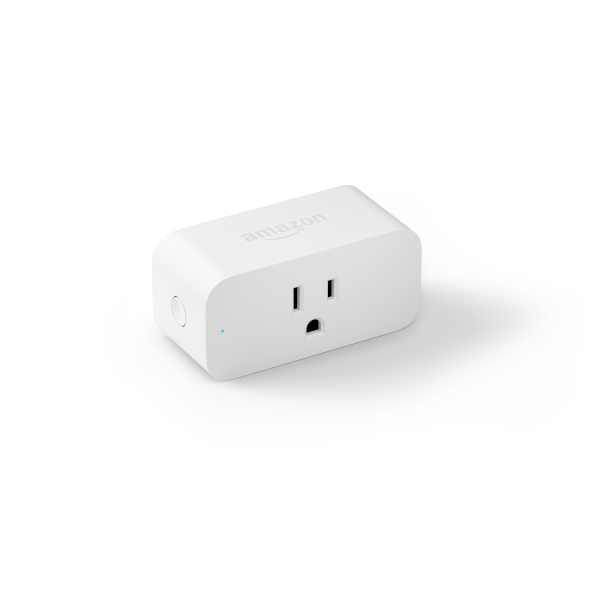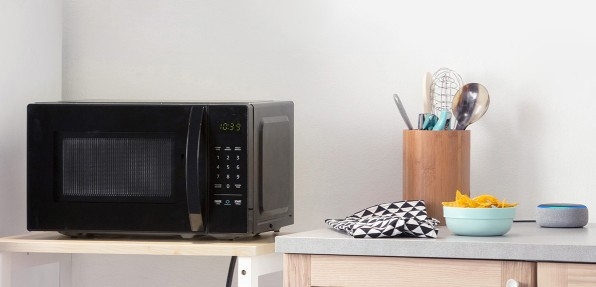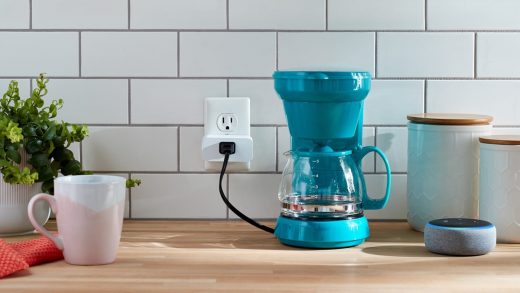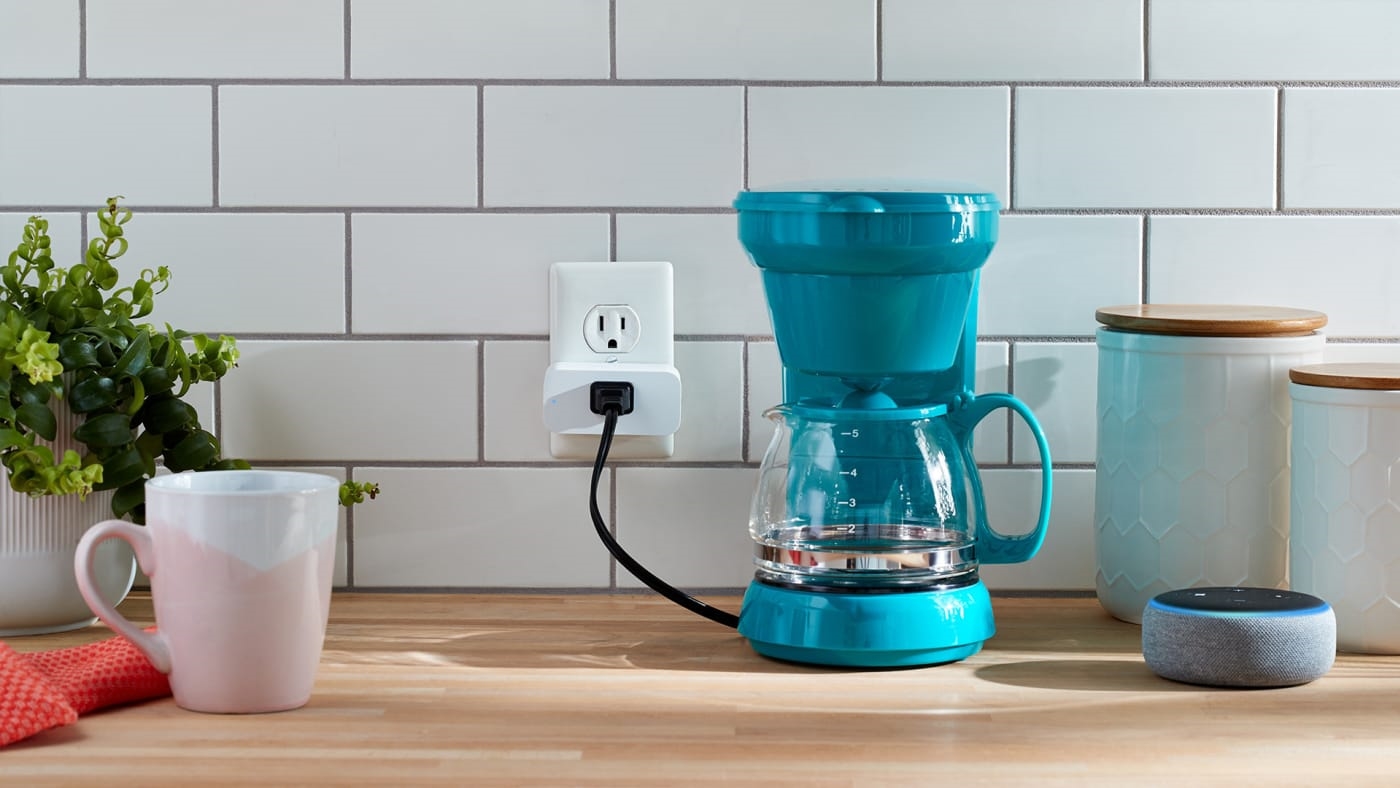With cheap new smart-home gear, Amazon wants to keep you in its world
Shop on Amazon for a smart plug today, and you’ll notice that the most popular options work with Amazon Alexa, Google Home, and in some cases Apple’s HomeKit. Connecting your bedside lamp or coffee maker to the internet, in other words, doesn’t require pledging allegiance to a single company’s voice assistant.
Amazon is looking to change that with its own smart plug, along with all the other Alexa-enabled products the company announced in September. Amazon’s new microwaves, stereo amplifiers, smart home hubs, and cord-cutting DVRs all have two things thing in common: They match or undercut comparable products on price, and they don’t work with competing voice assistants. The trade-off for Amazon’s low prices is being locked into the Alexa ecosystem.
Tech giants discouraging consumers from bonding with somebody else’s platform is not new. Apple, for instance, uses services like iMessage and accessories like AirPods to discourage iPhone users from considering Android. Amazon withholds its Prime Video apps from Google’s Chromecast devices and won’t sell some products from Google’s Nest. Google has retaliated by pulling its YouTube apps from Fire TVs and the Echo Show.

[Photo: courtesy of Amazon]
But smart home appliances have been an exception to the rule, as most of them aren’t built by the tech giants themselves. Products such as Philips Hue light bulbs, TP-Link smart plugs, and Ecobee thermostats try to support as many platforms as possible to serve the broadest potential audience. As a result, consumers have a degree of freedom to choose between different voice assistants. If you want to replace your Amazon Echos with Google Homes, or use Siri to control your home from an iPhone, you might not have to replace all the smart home hardware you’ve already bought.
This is the kind of flexibility that Amazon is now trying to discourage with its own plugs, microwaves, and more. By creating the devices itself, selling them cheaply, and giving them top billing on its website, Amazon is laying the groundwork for homes that are only compatible with Alexa.
Amazon started moving in this direction last year with the Echo Plus, a $150 Alexa speaker that doubles as a smart home hub for devices using the ZigBee connection protocol, and which Amazon has just upgraded with a new design and better sound quality. Using an Echo Plus obviates the need for a separate hub or bridge device to control certain bulbs, switches, and sensors, the trade off being that those devices will only work with Alexa. You don’t get the flexibility that comes with other hubs such as Samsung SmartThings (which supports Alexa and Google Home) or product-specific bridges such as the Philips Hue Bridge (which supports Alexa, Google Home, and Apple’s HomeKit).

[Photo: courtesy of Amazon]
Amazon has also been shunning other voice assistants as it moves into home security. The Amazon Cloud Cam, announced last year, requires an Alexa or Fire TV device to view video feeds by voice. And a few months after Amazon acquired Ring earlier this year, the smart doorbell maker indefinitely delayed the HomeKit integration it announced in 2016. (Ring says it’s still “eager to introduce HomeKit functionality,” but has shifted feature releases to ensure “the best possible experience with our products.”)
Selling even more Alexa-powered appliances–and pricing them to move–is the next logical step. The $25 Amazon Smart Plug is $10 cheaper than Belkin’s WeMo plug, and the same price as a smart plug from TP-Link. The $60 AmazonBasics Microwave is one of the cheapest microwaves you’ll find anywhere. The Echo Link Amp powers high-end speakers for $300–half the price of Sonos’ new speaker amp. The Echo Wall Clock is only a little pricier than the cheapest analog clocks at $30. The $230 Fire TV Recast undercuts other over-the-air DVRs such as TiVo’s Roamio OTA and Nuvyyo’s Tablo when you factor in its lack of subscription fees.
Along with releasing its own Alexa-first gear, Amazon is incentivizing other vendors to follow the same path. Along with the new consumer products, Amazon also announced the Alexa Connect Kit, which lets companies build smart home devices without having to write their own networking and security firmware or pay ongoing cloud computing fees. While Amazon says Connect Kit devices can work with non-Alexa voice assistants, it’s unclear how many companies will bother when the whole point of the kit is to minimize development efforts and costs. (Qualcomm and Intel offer similar kits that support multiple voice assistants, albeit without the flat cloud compute pricing that Amazon is offering.)
Over time, these efforts will result in more cheap smart home appliances that only work with Alexa, whether they’re made by Amazon or not. If you like Alexa and want to standardize your purchases around it anyway, that might not be a problem. But if you want to buy products that offer more flexibility, chances are you’ll pay more for the privilege.
Some companies are working on interoperability standards, which would connect any smart home device regardless of vendor, but Amazon isn’t supporting those efforts, and neither are Apple or Google. And why would they? The alternative–creating as many smart homes as possible that only they can control–looks much more attractive.
(36)



